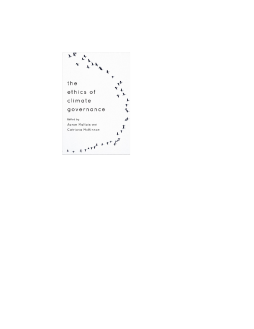
Additional Information
Book Details
Abstract
The ethics of climate governance is of critical importance to current debates in climate justice, yet until now it has been largely neglected. This book explores the ethical dimensions of bringing the threat of global warming under effective political control. It addresses problems of domination and vulnerability in international climate negotiations, democratic legitimacy and equity in climate governance, strategies for dealing with gridlock in climate governance, and new problems of governance raised by the technologies of geoengineering and biomass incineration. This hugely important and timely collection of essays showcases the latest work by established and the best emerging scholars in this field, striking out in a new direction in the climate justice debate.
Aaron Maltais is a Postdoctoral Fellow in Political Science at Stockholm University, Sweden. He has published articles on climate justice in, Political Studies, Environmental Values, and Environmental Politics.
Catriona McKinnon is Professor of Political Theory at the University of Reading. She is the author of Climate Change and Future Justice (2011), Toleration: A Critical Introduction (2006) and Liberalism and the Defence of Political Constructivism (2002).
Contributors: Ludvig Beckman, Professor of Political Science, Stockholm University, Sweden; Megan Blomfield, Lecturer in Philosophy, University of Bristol, UK; Clare Heyward, Post Doctoral Research Fellow in Politics and International Relations, University of Warwick, UK; Jonathan W. Kuyper, Post-Doctoral Researcher in Political Science, Stockholm University, Sweden; Christian Seidel, Lecturer, University of Erlangen-Nuremberg, Germany; Kristin Shrader-Frechette, O’Neill Family Professor, Department of Biological Sciences and Department of Philosophy, University of Notre Dame, USA; Patrick Taylor Smith, Post doctoral researcher, Stanford Centre for Ethics in Society, USA; Steve Vanderheiden, Associate Professor of Political Science and Environmental Studies, University of Colorado at Boulder, USA.
Climate governance is the most pressing political issue of our time, and ethics is right at the heart of it. This interesting and timely new collection, with its emphasis on an exciting new generation of authors in climate ethics, helps us to think more clearly about what matters.
Stephen Gardiner, Professor of Philosophy, University of Washington
Climate ethics, a field pioneered by philosophers, has now arrived in the world of politics. This collection of essays makes clear that there will be no effective climate governance without ethics and also provides an important starting point in addressing the central issues.
Dale Jamieson, Professor of Environmental Studies, University of New York
